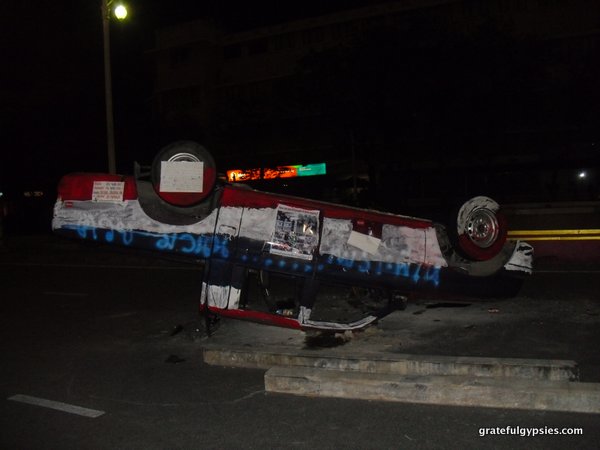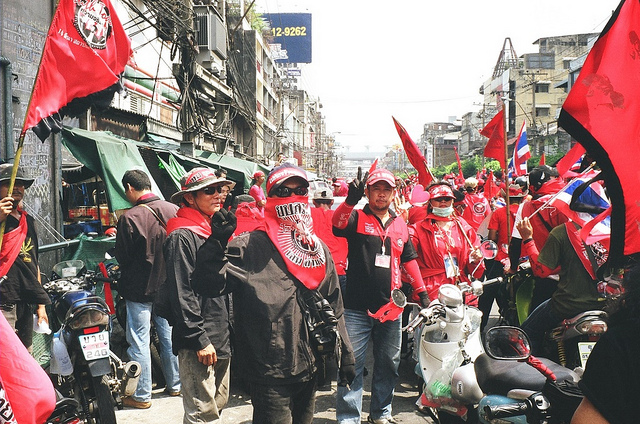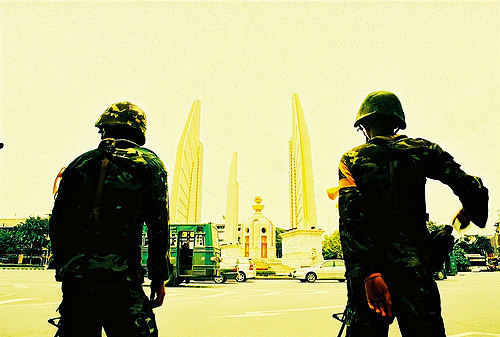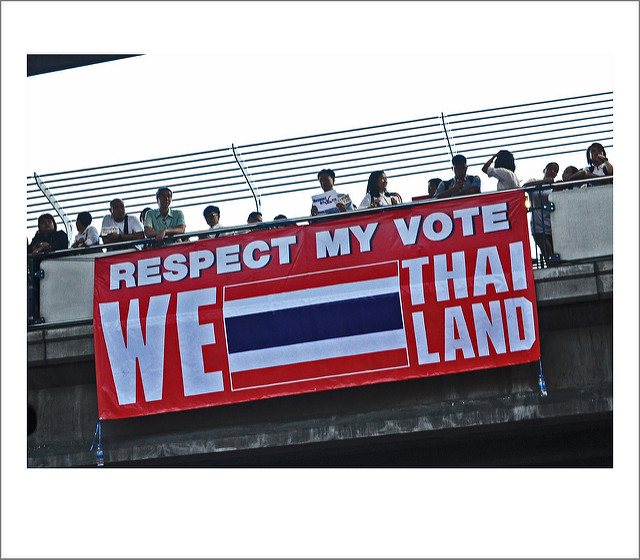What’s Going on with Thailand’s Government? Posted by sasha on Aug 3, 2016 in History, Thailand Politics
The government of Thailand can be quite confusing, especially in recent years. Ousted PMs, military coups, and new constitutions are just a few of the things that have happened in the last five years. With millions of Thai voters heading to the polls this weekend in an important referendum, it’s the perfect time to review what’s happened in the past few years and what the future of the country may be.
2013-14 Political Crisis
From November 2013-May 2014, political instability rocked Thailand. Anti-government protests were commonplace over this 6-month span, organized by the PDRC (People’s Democratic Reform Committee). These protests were triggered by a proposed amnesty bill that would have resulted in several politicians being pardoned from charges that occurred between 2004-2013. This included former Prime Minister Thaksin Shinawatra, who was overthrown in a 2006 coup and charged with corruption. He has been in self-imposed exile since 2008, but his influence remained strong on Thai politics. His sister, Yingluck, became PM in the 2011 election and was believed by many to be a puppet of her brother.
The political crisis was organized into color-coded allegiances. On one side, the “red shirts” supported the Shinawatras and were mostly rural, working-class people. On the other, the “yellow shirts” were adamantly against them and were mostly urban and middle-class. The protests led Yingluck to dissolve the House of Representatives and call for a snap general election. Protests continued and became increasingly violent, leading to a state of emergency being declared in Bangkok and surrounding areas. She remained in control as a caretaker, but she and her government would soon be ousted by the Constitutional Court.
2014 Coup
Rival factions were not able to reach an agreement to govern, leading the military to step in. Martial law was declared, but that wasn’t all the military had planned. Shortly thereafter, a coup was staged to overthrow the caretaker government. A junta called the National Council for Peace and Order (NCPO) was formed to govern the country, led by General Prayut Chan-ocha. This was nothing new for Thailand – it was the 19th attempted military coup in just 80 years. Political gatherings were banned, a curfew was put in place, and the constitution was suspended (except for the chapter on the monarchy).
Changes to the Constitution
Ten months after the coup, an interim constitution was put in place after the king gave his approval. It was criticized for being undemocratic and strengthening the powers of the military. Many felt the general and his military were backtracking on their promises to restore democracy to Thailand. This interim constitution established the NLA (National Legislative Assembly) as the only parliamentary body in Thailand. In August, the military-dominated legislature, whose members were handpicked by Prayut, made him the country’s new prime minister.
This constitution has remained in place up until now. The NCPO finally unveiled a new draft in March of this year. The proposed constitution will be voted on this Sunday (August 7) in a national referendum. If it passes, this will be the 20th constitution of Thailand.
The Vote
Voters will be asked two questions requiring simple yes-no answers:
Do you accept the draft constitution?
Should the Upper House of Parliament be permitted to join the Lower House in selecting a Prime Minister?
Not surprisingly, the current military government is in support of the referendum, along with some of the former “yellow shirt” groups. Former PMs (including Yingluck) are opposed, as well as “red shirt” groups and student activists. There hasn’t been much of a debate, though. According to the military’s rules, “people who propagate information deemed distorted, violent, aggressive, inciting or threatening so that voters do not vote or vote in a particular way” could face up to 10 years in jail and a fine of up to 200,000 baht. Polls aren’t exactly reliable in Thailand, but it’s looking like it’s pretty tight with a small majority leaning towards a “yes.” Either way, elections are scheduled for mid-2017 at the moment. A “yes” vote would give legitimacy to the NCPO and allow it to prepare for elections, while a “no” would mean they have to offer another option.
We’ll be watching the results and will continue to help our readers better understand the political situation in Thailand as things unfold. For now, let’s lighten the mood a bit by watching elephants handing out leaflets in the streets:

Build vocabulary, practice pronunciation, and more with Transparent Language Online. Available anytime, anywhere, on any device.
About the Author: sasha
Sasha is an English teacher, writer, photographer, and videographer from the great state of Michigan. Upon graduating from Michigan State University, he moved to China and spent 5+ years living, working, studying, and traveling there. He also studied Indonesian Language & Culture in Bali for a year. He and his wife run the travel blog Grateful Gypsies, and they're currently trying the digital nomad lifestyle across Latin America.







